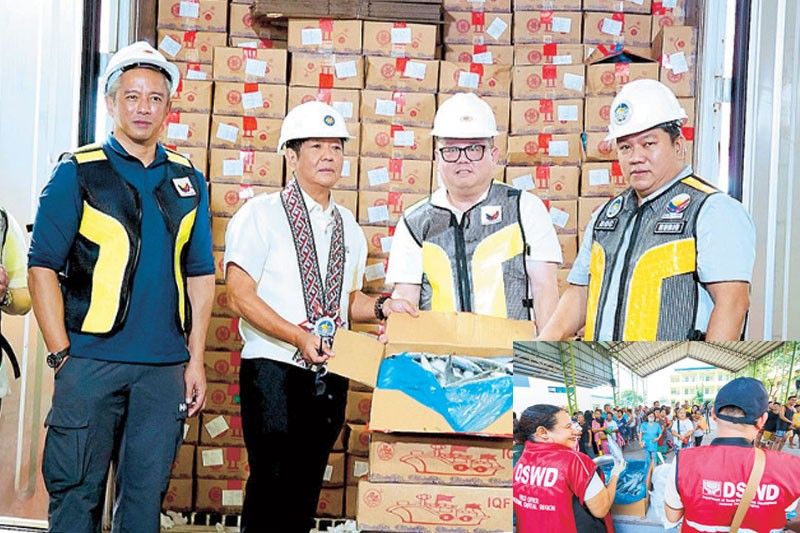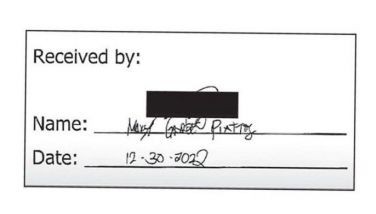Seized mackerel is 1st case under Agricultural Economic Sabotage Act

MANILA, Philippines — The government will have its first case of agricultural economic sabotage under Republic Act 12022 or the Anti-Agricultural Economic Sabotage Act against smugglers of P178.5 million worth of frozen mackerel seized by the Bureau of Customs (BOC) in October, President Marcos said yesterday.
Marcos made the declaration as he inspected 21 container vans of the confiscated shipment at the Port Area in Manila, and later led the donation of the goods to poor residents in Tondo.
“As I said, this is the first case under the new law of the Anti-Agricultural Sabotage Act. So, I’ve spoken to our Bureau of Customs and I’ve spoken to the Department of Agriculture and we have to keep going. We have to intensify it,” Marcos told reporters following the inspection. No other information, like the names of the importer or consignee, was given.
Signed by Marcos last Sept. 26, RA 12022 seeks to protect farmers, fisherfolk and consumers by defining and penalizing crimes related to agricultural economic sabotage like smuggling, hoarding, profiteering and cartel activities.
In signing the measure, Marcos cited the “staggering” loss of more than P3 billion to agricultural smuggling in 2023 alone.
RA 12022 repealed RA 10845 or the Anti-Agricultural Smuggling Act of 2016. Marcos had noted that smuggling, hoarding, profiteering and cartel operations involving agricultural and fishery products would be classified as economic sabotage – a non-bailable offense punishable by life imprisonment and fines of up to five times the value of the goods involved.
Under RA 12022, the Court of Tax Appeals shall have exclusive jurisdiction over cases related to agricultural economic sabotage and shall have the authority to handle and decide on criminal proceedings.
The frozen mackerel shipments, which came from China, were seized on Sept. 28 and 29 at the Manila International Container Port (MICP).
The shipment was intercepted by the BOC’s Intelligence and the MICP, in coordination with the DA’s Bureau of Fisheries and Aquatic Resources (BFAR), for lack of sanitary and phytosanitary clearances.
Officials said the consignee, which the BOC refused to name, is being investigated for possible violation of DA Memorandum Order No. 14, s. 2024 on the issuance of sanitary and phytosanitary import clearances for the importation of round scad, mackerel and bonito.
In November, BFAR declared the frozen mackerel safe for human consumption.
Upon the recommendation of the BOC, the Department of Finance approved the donation to the DA early this month.
Marcos distributed the confiscated fish to poor residents in Metro Manila on Saturday even as he issued a stern warning against smugglers disrupting the supply chain.
“Our Christmas present is different, instead of ham and lechon we brought fish, mackerel. So these won’t just be wasted,” the President said during the distribution of confiscated mackerel in Baseco Port Area in Tondo.
Twenty-one households in Barangay 649 in Baseco received the donated goods through the Department of Social Welfare and Development (DSWD). Each household received two kilos of mackerel.
Marcos said BFAR conducted laboratory tests, assuring that the frozen mackerel are safe for human consumption.
“Expect that when we have an incident like this, the first thing we think about is how to use these confiscated goods. Sometimes it’s not just food, there are agricultural products,” the President said.
Present at the event were Agriculture Secretary Francisco Tiu Laurel Jr., Social Welfare Secretary Rex Gatchalian, Interior and Local Government Secretary Jonvic Remulla, Manila Mayor Honey Lacuna and other officials.
The frozen mackerel will also be distributed to the poorest barangays in other areas in Metro Manila, as well as in Obando and Meycauayan in Bulacan and Bacoor in Cavite.
Select city jails, public hospitals and various care facilities also likewise received the confiscated goods. An estimated 150,000 families will benefit from the donation.
From July 2022 to November this year, the BOC has seized P5.87 billion worth of smuggled agricultural products as part of government efforts to address agricultural sabotage, the Presidential Communications Office said.
Meanwhile, the DA said it is firm on implementing a five-month long closed-fishing season – from November to March – in a bid to ensure sustainable fish production in the country.
Tiu Laurel defended the ban on large-scale fishing in key fishing grounds and the importation of fish to stabilize supply in the markets.
“Importation addresses temporary supply gaps caused by the closed-fishing season or events like typhoons. It complements, not replaces, local fish production to keep prices stable,” he said.
Just last month, the DA approved the importation of additional 8,000 metric tons of frozen fish on top of the earlier allocation of 30,000 MT.
The DA said this helps mitigate the effects of typhoons on the local fish supply.
The DA said the ban is a science-backed move to replenish fish stocks and secure long-term food security for the nation.
Fishing group PAMALAKAYA criticized the move, saying that it disadvantages small fisherfolk and benefits only importers.
“Fish species like sardines, mackerel and round scad spawn heavily during these months. For instance, sardines in Zamboanga Peninsula peak from November to February. Protecting spawning areas during this period allows stocks to recover,” BFAR executive director Isidro Velayo said in defense of the five-month fishing ban.
The DA said it has given out support to affected fisherfolk, including fuel subsidies, livelihood programs and aquaculture assistance. — Ghio Ong, Romina Cabrera
- Latest
- Trending





























